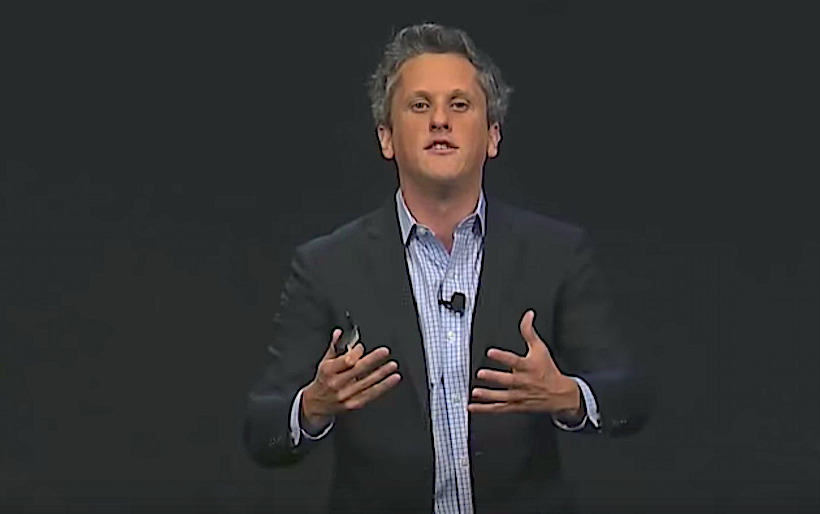 BIG DATA
BIG DATA
 BIG DATA
BIG DATA
 BIG DATA
BIG DATA
It’s no surprise that cloud content management company Box Inc. keeps losing money as it chases growth, but the strategy means that investors get a little worried when results don’t keep smashing their expectations.
That’s what happened today. Box announced that it lost 11 cents a share in its fiscal 2018 second quarter ended July 31, before certain costs such as stock compensation. That’s down from a 14-cent loss a year ago. Net loss was $39.3 million, or 30 cents a share. Revenue rose 28 percent, to $122.9 million.
Analysts had expected an adjusted loss of 13 cents a share on $121.7 million in revenue, so although the bottom line was noticeably better than predicted, revenue growth outpaced expectations by only a hair.
But after going cash-flow positive for two straight quarters, the company reversed course. Free cash flow went out the door this quarter at a negative $14.7 million. But the second quarter is customarily its lowest quarter for cash flow, Dylan Smith, Box’s co-founder and chief financial officer, said on the earnings conference call. And unusual expenses included prepayments on the company’s BoxWorks customer conference in October and expanded facilities in Japan.
Box also provided updated earnings guidance narrowed toward the low end of previous forecasts. For the current quarter, it’s expecting revenue between $128 million and $129 million, with an adjusted loss of 13 to 14 cents a share. For the full year, it’s forecasting a similarly narrow range of $503 million to $506 million and an adjusted loss of 44 to 46 cents a share.
With investors perhaps hoping for better news, shares were falling more than 3 percent in after-hours trading. In regular trading, shares rose nearly 2 percent, to $19.65 a share. For the year so far, shares are up more than 40 percent. Update: Investors didn’t think it was quite so bad after sleeping on it, as shares closed down only a small fraction Thursday, to $19.62 a share.
Still, results hardly fell off a cliff. Billings, a key metric of future growth, jumped 31 percent, to $139.5 million, ahead of Wall Street’s forecast of $134.3 million. Another forward-looking metric, deferred revenue, rose a similar 32 percent, to $240.8 million.
“Our new investments in sales and marketing started to bear results,” with the largest quarterly pipeline in Box’s history, co-founder and Chief Executive Aaron Levie said on the earnings call.
During the quarter, Box closed eight deals worth over $500,000 and four worth over $1 million, up from five over $500,000 and just one over $1 million a year ago. The big deals included Amazon.com Inc., Delta Global Services LLC and United Talent Agency. Some 39 deals were over $100,000. More than 60 percent of the six-figure deals included new products, Smith said.
Box, which went public two years ago, has been busy all year developing new products to expand its offerings further beyond its original file-sharing, as well as forging technology partnerships to bolster its existing products. In mid-August, it announced a deal with Google Inc. to use the search giant’s Cloud Vision technology to automatically recognize files such as forms and receipts. In the second quarter, it introduced, among other things, Box Drive, a unlimited cloud drive for large enterprises that Levie said was seeing “tremendous early demand,” and Box Elements, a set of software tools to embed Box content into applications built on its platform.
Also this year, it has launched partnerships and integrations on various products with Amazon Web Services Inc., Google Cloud Platform and Facebook Inc. In January, it revamped its three-year-old Notes real-time document creation and sharing tool with features such as a simpler web interface to make it more broadly appealing.
Still, Box continues to face heavy competition, even from the likes of partners such as Google, Microsoft Corp. and Amazon.com Inc. One direct rival, Dropbox Inc., is pushing ahead on some of the same fronts, and CEO Drew Houston said early this year that the company expects to pass $1 billion in revenue this year. Reports in late July said Dropbox may go public as early as this year.
Support our mission to keep content open and free by engaging with theCUBE community. Join theCUBE’s Alumni Trust Network, where technology leaders connect, share intelligence and create opportunities.
Founded by tech visionaries John Furrier and Dave Vellante, SiliconANGLE Media has built a dynamic ecosystem of industry-leading digital media brands that reach 15+ million elite tech professionals. Our new proprietary theCUBE AI Video Cloud is breaking ground in audience interaction, leveraging theCUBEai.com neural network to help technology companies make data-driven decisions and stay at the forefront of industry conversations.